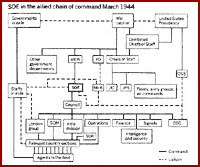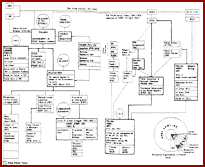Government in Exile
While the AK and AL cooperated in local matters, political factions disagreed,
sparred and fought for control or dominance (Davies 1981; Nowak, 1983). The AK
was in direct contact with the Delegatura or Home Delegation who administrated
the whole of the underground movement. Many of the pre-war politicians and administrators
had fled to Rumania and then to London via France. General Sikorski formed the
Government in Exile and became the symbol of resistance to Nazism. Policy was
managed by the Consultative Political Committee (PKP), which had representatives
supporting the process of political consultation and attempts in convergence of
ideology.
Sikorski's strength lay in his ability as prime minister and head of armed forces
to manage the various political and military factions. After Sikorski's death,
his military successor General Kazimierz Sosnkowski surrounded himself with pre-war
supporters of Pilsudski. The new premier, Stanislaw Mikolajczyk leader of the
Peasants Party, had an intense dislike of Pilsudski's cronies or even that era
of politics. Even the famous courier Jan Nowak found dealing with the military
and political intrigue in London interfered with his own missions. The level of
infighting may have caused Churchill and his team of advisors like Hugh Dalton
(Head of SOE) to be less generous in funding and supporting the underground army
despite their special status in London. Other factors like distance and availability
of arms and personnel or even suitability of aircraft may have sidelined Polish
projects in favour of mainland Europe and the Balkans.
The Teheran Conference was the nemesis for the Bolshevik defeat in 1921. Stalin
demanded that Poland would move its frontiers to the Curzon Line (boundary proposed
by Lord Curzon in 1920 which follows the River Bug) in the reorganization of post
war Europe. Woodward (1971) saw the Teheran Conference as a success for Stalin
as Poland would be subservient politically and geographically to Russia. The 'Iron
Curtain' had been created and the foundation of the 'Cold War'. Sosnkowski saw
a military solution would settle for a 'greater' Poland and felt Mikolajczyk was
no match for Churchill or Stalin and would settle for less (Nowak, 1983). Churchill
saw that Soviet influence in post war Central and Eastern Europe would be negotiable
with Britain sidelined along with the Government in Exile. The Eastern frontier
became a major issue between the Poles and Churchill who would not support the
demands for Greater Poland. Even when Zygmunt Berezowski, leader of the National
Democratic Party headed up a delegation smuggled out of Poland in April 1944,
Churchill would not yield (Nowak, 1983; Stafford, 1997).
Sosnkowski grew suspicious of the allies and concluded shift in policy and support
in other war zones like Yugoslavia would also impact upon both military and political
support for Poland (Nowak, 1983). The final betrayal was worked out at Yalta.
At the close of the war, all Polish war personnel would become in effect 'mercenaries'
and the country trimmed to suit Soviet demands.

SOE in the Allied chain of
command March 1944. (Source: Foot, 1990)

|
|

The Grand Alliance 1941-1945
(Source: Davies, 1981)
 |
|